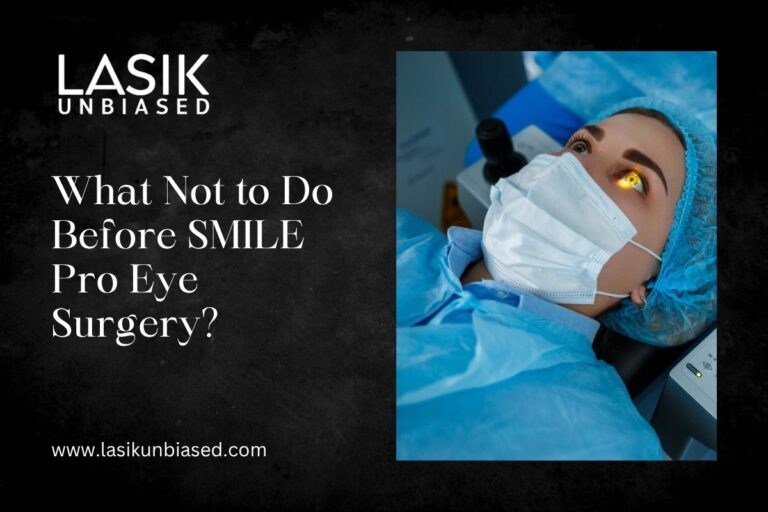Wearing contact lenses, applying eye makeup, or taking certain medications before SMILE Pro eye surgery can jeopardise your results and increase your risk of complications.
To ensure a smooth procedure and optimal recovery, there are several things you should absolutely avoid in the days and weeks leading up to your surgery.
Preparing for SMILE Pro eye surgery is about more than just marking your calendar. Your choices in the days and weeks before the procedure play a direct role in your safety, comfort, and visual outcome. Here’s a clear guide to what not to do—and why each point matters.
Avoid Wearing Contact Lenses Before SMILE Pro Eye Surgery
Contact lenses can temporarily alter the shape of your cornea, which is precisely what your surgeon will be correcting during SMILE Pro. If you keep wearing them right up to your surgery, your eyes may not return to their natural shape in time, and your results could be less accurate.
- Soft contact lenses: Stop wearing these at least 7 days before your pre-surgery checkup and surgery day.
- Hard or rigid gas permeable (RGP) lenses: Discontinue use at least 3-4 weeks prior.
- Orthokeratology (Ortho-K) lenses: These require even more time—stop wearing them at least 3 months in advance.
Switch to glasses during this period to allow your eyes to stabilise.
Do Not Use Eye Makeup or Cosmetics Around the Eyes
Eye makeup—including mascara, eyeliner, and eyeshadow—can introduce bacteria and increase your risk of infection during and after surgery. Even tiny traces left behind can cause problems.
- Stop all eye makeup at least 24 to 48 hours before surgery, or as advised by your surgeon.
- Avoid lotions, creams, or skincare products with perfume or alcohol near your eyes the day before and the day of surgery.
- Skip hair gel, perfume, or cologne on surgery day—they can interfere with the sterile environment.
Arrive with a clean, makeup-free face to minimise infection risk.
Do Not Take Certain Medications or Supplements Without Doctor’s Approval
Some medications and supplements can interfere with anaesthesia, healing, or the surgery itself.
- Oral acne medications (like isotretinoin/Accutane): Stop these several weeks before surgery, as they can dry out your eyes and affect healing.
- Blood thinners, herbal supplements (such as ginkgo, garlic, ginseng, or turmeric), or over-the-counter medications: Always disclose everything you’re taking to your surgeon in advance. Some may need to be paused; never stop prescription medications without medical guidance.
- If you have chronic conditions (like diabetes, hypertension, or thyroid issues), inform your ophthalmologist about all your medications and health status before surgery.
Always be transparent with your medical team.
Do Not Ignore Pre-Operative Instructions from Your Surgeon
Every patient is unique—your surgeon may provide specific advice based on your eye health, lifestyle, or medical history. Failing to follow these instructions can increase your risk of complications or delay your procedure.
- Stick closely to any instructions your surgeon gives you about eating, medications, and hygiene.
- Ask questions if you’re unsure about any part of your preparation.
Your surgeon’s instructions are tailored to your needs.
Make Sure Someone Drives You Home After Surgery
You will not be able to drive safely after SMILE Pro eye surgery. Your vision may be blurry, and you’ll likely have received medications that impair your ability to drive.
- Arrange for a responsible adult to accompany you to and from the clinic.
- Refrain from driving on both your evaluation day and the day of surgery.
Having support ensures you get home safely and can focus on recovery.
Do Not Arrive in Inappropriate Clothing
Comfort and practicality matter on surgery day. Avoid clothes that pull over your head, as you don’t want to accidentally touch your eyes when changing.
- Wear a shirt or blouse that buttons or zips up the front.
- Avoid wearing jewellery or accessories that could interfere with the procedure.
Dress for comfort and convenience.
Do Not Neglect to Disclose Allergies or Recent Illness
Allergies (especially to medications or anaesthetics) and recent illnesses can affect your surgery and recovery.
- Tell your doctor about any drug allergies or sensitivities before surgery.
- If you’ve had any recent eye infections, colds, or other illnesses, inform your medical team right away.
Full disclosure helps your team keep you safe.
Do Not Plan Strenuous Activities or Travel Immediately Before or After Surgery
Heavy exercise, swimming, or travel can increase your risk of complications.
- Avoid swimming, steam rooms, and contact sports for at least a week after surgery.
- If you have travel plans, discuss them with your surgeon—flying or being away from your doctor in the critical early days isn’t recommended.
Give yourself time to heal and attend all follow-up appointments.
Things to Avoid Before Undergoing SMILE Pro Eye Surgery? Quick Reference Table
| Don’t Do This | Why It Matters? |
| Wear contact lenses | Changes corneal shape; may reduce surgical accuracy |
| Use eye makeup or skincare near eyes | Raises risk of infection |
| Take certain meds/supplements | Can interfere with anesthesia or healing |
| Ignore surgeon’s instructions | Raises risk of complications |
| Drive yourself on surgery day | Vision and alertness will be impaired |
| Wear pull-over clothing | Risk of touching/rubbing eyes post-surgery |
| Hide allergies or recent illness | Can lead to unsafe conditions during or after surgery |
| Plan strenuous activities/travel | May disrupt healing or follow-up care |
What Else Should You Avoid? Common Myths and Mistakes
- Don’t skip meals unless your surgeon instructs you: You may need to eat a light meal before surgery, but always follow your doctor’s directions.
- Don’t start new skincare or eye treatments: Avoid facials, chemical peels, or lash treatments in the week leading up to surgery.
- Don’t use over-the-counter eye drops without approval: Some drops can interfere with healing or mask symptoms your surgeon needs to know about.
How to Set Yourself Up for Success?
- Prepare your home: Stock up on artificial tears, comfortable pillows, and any medications your surgeon prescribes.
- Arrange time off work: Plan for a day or two of rest after surgery, depending on your job and your surgeon’s advice.
- Plan your transportation and support: Make sure someone can drive you and help you get settled at home.
Final Thoughts: Prepare Smart, Heal Well
What you don’t do before SMILE Pro eye surgery is just as important as what you do. Avoiding contact lenses, makeup, certain medications, and other risky behaviours gives your eyes the best chance to heal quickly and see clearly. Always follow your surgeon’s specific instructions, keep your medical team informed, and prioritise rest and safety in the days before and after your procedure.
If you have questions about your preparation, reach out to your eye care provider—they’re your best resource for a safe, successful SMILE Pro experience.


